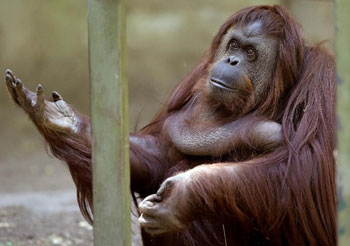Should animals be given “human rights?”

An Argentine court made history when it granted an orangutan, ‘Sandra’, some legal rights that have traditionally been reserved for humans. The BBC reports:
Lawyers for Argentina’s Association of Professional Lawyers for Animal Rights (Afada) said Sandra was “a person” in the philosophical, not biological, sense.
She was, they argued, in a situation of illegal deprivation of freedom as a “non-human person”.1
The BBC did not include a comment from Sandra expressing her thoughts about her newfound rights.
Animals are not people
The primary argument against giving non-humans these sorts of rights is simple: they are not humans. They do not have cognition skills comparable to humans, and they could not exercise human rights even if we gave them to them. This is because humans are uniquely created in the image of God.
Apes cannot participate in a Republic or set up a monarchy; they cannot create art; they cannot contemplate their own existence and inevitable demise. They can’t even come close to real language. They are delightful, clever animals, but only animals. There is a yawning chasm separating them and all other animals from humans. To give animals human rights will cause confusion—because what precisely does it mean? If the court’s decision is upheld, Sandra will not gain the right to vote and non-discrimination in employment—she will simply be moved to a slightly more comfortable form of ‘incarceration’ at an animal sanctuary.
When humans do not have human rights
It is ironic that some are in favor of giving animals human rights that are not shared by all humans. For instance, babies in the womb have no right to life—they may be slaughtered at their mothers’ request up to birth. Some countries have legalized euthanasia for disabled infants, and leading evolutionary atheist Richard Dawkins claims that there is a duty to abort babies with Down Syndrome. Most infamously, soi-disant ethicist Peter Singer is a co-founder of the Great Ape project, but also supports abortion, infanticide, and euthanasia.
When humans are viewed as only another animal, some people inevitably use this as an excuse to mistreat others. For instance, Ota Benga was displayed in a zoo as an example of a “missing link”, and thousands of Aboriginal Australians were slaughtered because they were viewed as not fully human.
Biblical creation is the answer
G.K. Chesterton said:
Darwinism can be used to back up two mad moralities, but it cannot be used to back up a single sane one. The kinship and competition of all living creatures can be used as a reason for being insanely cruel or insanely sentimental; but not for a healthy love of animals … That you and a tiger are one may be a reason for being tender to a tiger. Or it may be a reason for being as cruel as the tiger. It is one way to train the tiger to imitate you, it is a shorter way to imitate the tiger. But in neither case does evolution tell you how to treat a tiger reasonably, that is, to admire his stripes while avoiding his claws.
If you want to treat a tiger reasonably, you must go back to the garden of Eden. For the obstinate reminder continues to recur: only the supernaturalist has taken a sane view of Nature.2
Biblical creationists recognize that animals are created by God, which encourages conservation and responsible stewardship of creation, but also keeps us from inappropriately elevating them beyond what is appropriate.
When we deny the special status of mankind as created in the image of God, it invariably leads to elevating animals to the status of man, or worse, demoting certain kinds of people to the level of animals.
References and notes
- Court in Argentina grants basic rights to organutan, BBC News, 21 December 2014, bbc.com. Return to text.
- Chesterton, G.K., Orthodoxy, John Lane, London, pp. 204–205, 1927. Return to text.






Readers’ comments
Comments are automatically closed 14 days after publication.